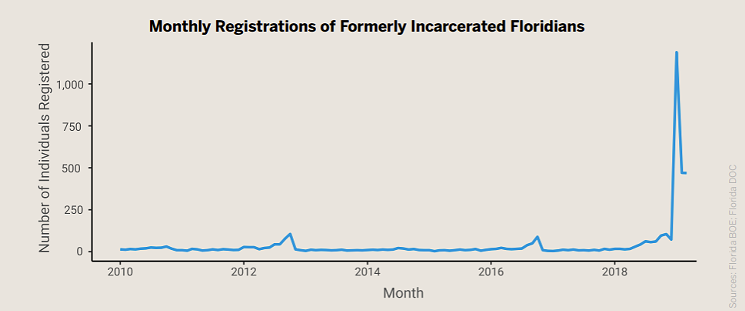
Following Florida’s decision to restore voting rights to convicted felons last year, it has been revealed that the state’s new poll tax disproportionately suppresses those same voters.
The Jim Crow-era law prevented felons from voting after their prison terms ended. It was a racially-motivated law that was written by white supremacists who wanted to prevent newly freed slaves from having a say in elections. The law was abolished after Florida voters passed a constitutional amendment in 2018. However, despite the law being passed to automatically restore voting rights for former prisoners, Florida Republicans passed a law forcing ex-inmates to pay a massive amount of court fines and fees before they would be able to get their voting rights back. The new law has been dubbed the 21st-century version of a Jim Crow-era “poll tax”, Miami New Times reports.
But a new study was released late last week from New York University’s Brennan Center for Justice that proves the new law was designed to prevent black Floridians from voting. The researchers reviewed voter registration data from the time Amendment 4 passed in November 2018 until the new restrictions went into effect this month and found that black men had been registering to vote at a rapid rate.
“By looking at voter registration data since Amendment 4 went into effect, we can see that black and low-income returning citizens are dramatically impacted by this new legislation,” the study’s authors warned.

WLRN reporter Danny Rivero first warned of the racially-motivated law back in January and has continued to raise awareness on the shady law.
.@BrennanCenter released a new report about who would be impacted by Florida’s Amendment 4 bill on felon voting rights:
— Danny Rivero (@TooMuchMe) May 13, 2019
“There can be no mistaking the racial and class implications of this regressive new legislation.”https://t.co/evSElOVQ96 pic.twitter.com/I9K2a2DwFz
“The impacts of the criminal justice system fall heavily on lower-income and minority communities,” the Brennan Center states. “Felony disenfranchisement policies, by extension, disproportionally strip these communities of their political power. “
Press play below for more on this story.


